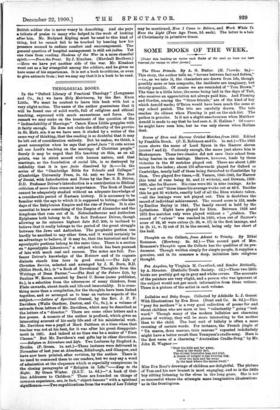THEOLOGICAL BOOKS.
In the "Oxford Library of Practical Theology" (Longmans and Co., 5s.) we have Holy Matrimony, by the Rev. Knox Little. We must be content to leave this book with but a very slight notice. The name of the author guarantees that it will be found one of solid worth, full of religious and ethical teaching, expressed with much earnestness and force. One remark we may make on the treatment of the question of the " Indissolubility of Marriage." Canon Knox Little grapples with it fairly enough. He does not elude the difficulty of the proviso in St. Matt. xix. 9 as we have seen it eluded by a writer of the same way of thinking, that the reading is so doubtful that it may be left out of consideration entirely. But he makes, we think, a great assumption when he says that prima facie "it cuts across all our Lord's teaching on the marriage of Christian people." Surely it may be urged that His teaching on this, as on all points, was in strict accord with human nature, and that marriage, as the foundation of social life, is so destroyed by infidelity that it is ipso facto dissolved by it.—In the series of the " Cambridge Bible for Schools and Colleges " (Cambridge University Press, 2s. 6d. net) we have The Book of Daniel, with Introduction and Notes by the Rev. S. R. Driver, D.D. Professor Driver's introduction is a contribution to Biblical criticism of more than common importance. The Book of Daniel cannot be adequately studied without an adequate knowledge of a considerable period of E astern history. It is necessary to be familiar with the age to which it is supposed to belong,—the last days of the Babylonian Empire and the rise of Persia. It is also essential to know something of the Empire of Alexander and the kingdoms that rose out of it. Nebuchadnezzar and Antiochus Epiphanes both belong to it. In fact Professor Driver, though allowing as its extreme highest date B.C. 300, is inclined to believe that it really belongs to the period of the great struggle between the Jews and Antiochus. The prophetic portion can hardly be ascribed to any other time, and it would certainly be an advantage to believe, if it may be, that the historical and the apocalyptic portions belong to the same time. There is a section on "Apocalyptic Literature," a subject which has been pursued of late with much zeal and success. The notes are full. Pro- fessor Driver's knowledge of the Hebrew and of its cognate dialects stands him here in good stead.—The Life of Christian Service, selected and arranged by J. H. Burn, B.D. (Elliot Stock, 6s.), is " a Book of Devotional Thoughts from the Writings of Dean Farrar."—The Book of the Future Life, by Pauline W. Booze, assisted by David C. Roose (same publisher, 6s.), is a selection from the utterances of many thinkers, from Plato onwards, about death and life and immortality. It is some- thing more than a compilation, for the thoughts have been linked together, and so arranged as to bear on various aspects of the subject.—Letters of Spiritual Counsel, by the Rev. J. P. F. Davidson (Wells Gardner, Darton, and Co., 6s.), is a volume of extracts from letters of Mr. Davidson, which may be described as the letters of a "director." There are some other letters and a few poems. A memoir of the author is prefixed, which gives an interesting account of his early life and of his ministerial work. Mr. Davidson was a pupil of Mark Pattison at a time when that teacher was not at his best, for it was after his great disappoint- ment in 1851. And indeed at no time was he a maker of " First Classes." But Mr. Davidson's real gifts lay in other directions. —Religion in Literature and Life. Two Lectures by Stopford A. Brooke. (P. Green. ls. net.)—These lectures were delivered in November of last year at Aberdeen, Edinburgh, and Glasgow, and have now been printed, after revision, by the author. There is no need to commend them to our readers, but we may say a word of admiration at the eloquence which is especially conspicuous in the closing paragraphs of " Religion in Life."—Keep to the Right. By Grace Winter. (S.S.U. Is. 6c1.)—" A book of Out- line Addresses to Children." These are founded on things of common experience, are, in fact," object-lessons" with a spiritual significance.—Two republications from the works of Leo Tolstoy may be mentioned, How I Came to Believe, and Work While Ye Have the Light (Free Age Press, 3d. each). The latter is a tale of Christianity in primitive times.






































 Previous page
Previous page